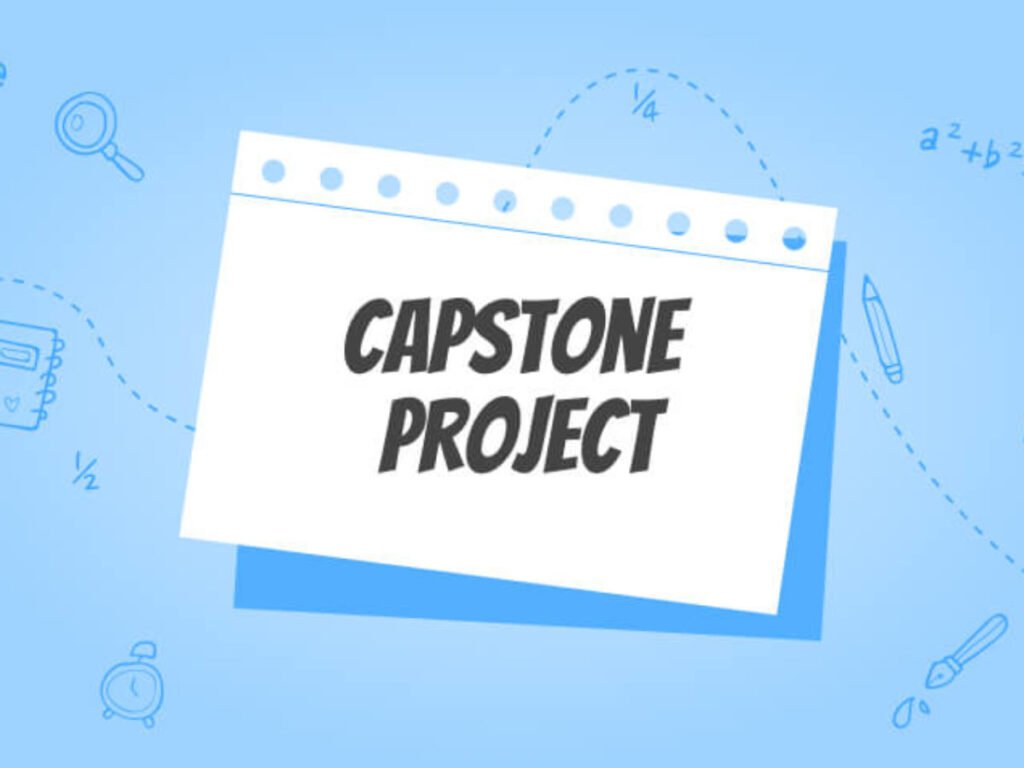Capstone projects—a type of academic work that gathers students’ experiences—are an integral part of academics. Before you begin, it is imperative that you comprehend the purpose of a capstone project and why it is required. This project aims to test the skills and competencies that students have gained during the course. This type of paper is mainly presented in various forms, such as case studies, research papers, surveys, and focus groups. Meanwhile, the type and complexity of the project mainly depend on the tutor’s requirements and course. Students are asked to present their capstone ideas for approval. Once it gets approved, they are supposed to write about that.
You must be thinking why it is so important to write a Capstone project, Right? It is essential as it shows how well students have done in their studies. It proves that the students are all set for the difficulties they might face in their jobs. This project is designed to combine student learning with hands-on experience to help develop them into a skilled and well-rounded graduate.
This project integrated teamwork ability in the students as they worked together in groups to develop innovative solutions for real-life problems. This also gives them a chance to improve their leadership and management skills.
Why Would Someone Do a Capstone Project?
Understanding the overarching goal is essential before you set out on a capstone assignment.
It empowers the students for the professional world.
Boosts the CV and helps them to stand out as a candidate.
Students get valuable practical experience
It emphasizes skills that employers highly demand
Let’s navigate each phase of the capstone project process in this comprehensive guide. Get Capstone project help and real-world examples to deal with the complexities of creating a valued capstone project.
Crafting a Capstone Project – A Step-by-Step Guide
Now, let’s delve into the systematic steps that constitute the writing process of a capstone project. Understanding these steps is essential for successfully navigating the intricate task ahead.
Topic Selection:
Coming up with an innovative capstone project begins with self-analysis. Before you finalize a topic, identify subjects that genuinely interest you and with your strengths. If you are passionate about the topic, it will fuel your dedication throughout the project.
Your chosen topic should also align with your academic objectives and future career aspirations. The nature of an appropriate project topic is that it will contribute to academic growth while preparing you for challenges in the respective field.
If you feel out of ideas, you can go through academic journals, books, and reliable online resources. Remember to seek approval from your professor.
Conduct Literature Review:
Ensure that you have defined the scope and object In the starting phase of the project. It includes making a clear outline of the goal of your literature review with a focused and purposeful examination of existing research. Conducting a literature review usually includes identifying key concepts and theories relevant to the project, building a foundation for understanding the existing and informing your project. Invest time in writing a compelling literature review as it is supposed to pinpoint gaps or unanswered questions and hypotheses.
Generate a Research Question:
Write a clear and concise research question highlighting the gaps in your literature review. Make sure that the question you write is specific and directly connects to your project’s objectives. The question you compose is a foundation for your capstone project that guides your exploration and contributes to the overall objective.
Methodology Designing and Data Collection:
While designing the methodology for the project, careful consideration should be given to select research methods that best suit the project objectives. More so, the chosen methodology should always align with your research question and the data type. Then, detailing the process for data collection is the next step that can’t be ignored.
Gather the data diligently to ensure accurate recording and organization for the appropriate analysis. Also, initiate regular assessments to validate the accuracy and reliability of collected data.
The Writing Phase:
In the writing phase, arrange your capstone project in a logical manner, adhering to the format that comprises necessary elements such the introduction, methodology, findings, and conclusion. Maintain a unified writing style that makes sense and is easy to read, making it easier for the reader to comprehend.
Finalization and Submission:
In the finalization and submission stage, proofread the written work thoroughly for grammar and formatting. It will enhance the professionalism of the document. Check on the citation and reference, as it is vital to ensure accuracy and completeness. Finalize a document that is organized well. Following the prescribed format, it reflects professionalism and dedication in its presentation.
Conclusion
To sum up, students struggling to manage their capstone project load usually search the internet with the “do my coursework” prompt, seeking assistance and support to navigate academics. This step-by-step guide ensures a comprehensive and informed starting point for a well-written capstone project. With the help of this guide, you can get a well-rounded understanding of the process that empowers you to embark on a capstone journey with confidence and proficiency. One thing you should remember is not to pick topics that require tons of calculations or complex concepts, as not everyone is fond of playing with numbers and gets bored.
